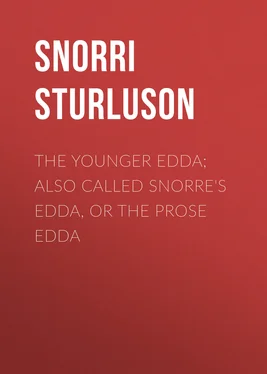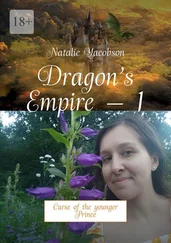Snorri Sturluson - The Younger Edda; Also called Snorre's Edda, or The Prose Edda
Здесь есть возможность читать онлайн «Snorri Sturluson - The Younger Edda; Also called Snorre's Edda, or The Prose Edda» — ознакомительный отрывок электронной книги совершенно бесплатно, а после прочтения отрывка купить полную версию. В некоторых случаях можно слушать аудио, скачать через торрент в формате fb2 и присутствует краткое содержание. Издательство: Иностранный паблик, Жанр: foreign_poetry, Мифы. Легенды. Эпос, Поэзия, foreign_antique, foreign_prose, на английском языке. Описание произведения, (предисловие) а так же отзывы посетителей доступны на портале библиотеки ЛибКат.
- Название:The Younger Edda; Also called Snorre's Edda, or The Prose Edda
- Автор:
- Издательство:Иностранный паблик
- Жанр:
- Год:неизвестен
- ISBN:нет данных
- Рейтинг книги:3 / 5. Голосов: 1
-
Избранное:Добавить в избранное
- Отзывы:
-
Ваша оценка:
- 60
- 1
- 2
- 3
- 4
- 5
The Younger Edda; Also called Snorre's Edda, or The Prose Edda: краткое содержание, описание и аннотация
Предлагаем к чтению аннотацию, описание, краткое содержание или предисловие (зависит от того, что написал сам автор книги «The Younger Edda; Also called Snorre's Edda, or The Prose Edda»). Если вы не нашли необходимую информацию о книге — напишите в комментариях, мы постараемся отыскать её.
The Younger Edda; Also called Snorre's Edda, or The Prose Edda — читать онлайн ознакомительный отрывок
Ниже представлен текст книги, разбитый по страницам. Система сохранения места последней прочитанной страницы, позволяет с удобством читать онлайн бесплатно книгу «The Younger Edda; Also called Snorre's Edda, or The Prose Edda», без необходимости каждый раз заново искать на чём Вы остановились. Поставьте закладку, и сможете в любой момент перейти на страницу, на которой закончили чтение.
Интервал:
Закладка:
Snorri Sturluson
The Younger Edda; Also called Snorre's Edda, or The Prose Edda
TO HON. THOS. F. BAYARD, AMBASSADOR TO THE COURT OF ST. JAMES, IN GRATEFUL RECOLLECTION OF PLEASANT OFFICIAL RELATIONS.
PREFACE
In the beginning, before the heaven and the earth and the sea were created, the great abyss Ginungagap was without form and void, and the spirit of Fimbultyr moved upon the face of the deep, until the ice-cold rivers, the Elivogs, flowing from Niflheim, came in contact with the dazzling flames from Muspelheim. This was before Chaos.
And Fimbultyr said: Let the melted drops of vapor quicken into life, and the giant Ymer was born in the midst of Ginungagap. He was not a god, but the father of all the race of evil giants. This was Chaos.
And Fimbultyr said: Let Ymer be slain and let order be established. And straightway Odin and his brothers—the bright sons of Bure—gave Ymer a mortal wound, and from his body made they the universe; from his flesh, the earth; from his blood, the sea; from his bones, the rocks; from his hair, the trees; from his skull, the vaulted heavens; from his eye-brows, the bulwark called Midgard. And the gods formed man and woman in their own image of two trees, and breathed into them the breath of life. Ask and Embla became living souls, and they received a garden in Midgard as a dwelling-place for themselves and their children until the end of time. This was Cosmos.
The world’s last day approaches. All bonds and fetters that bound the forces of heaven and earth together are severed, and the powers of good and of evil are brought together in an internecine feud. Loke advances with the Fenris-wolf and the Midgard-serpent, his own children, with all the hosts of the giants, and with Surt, who flings fire and flame over the world. Odin advances with all the asas and all the blessed einherjes. They meet, contend, and fall. The wolf swallows Odin, but Vidar, the Silent, sets his foot upon the monster’s lower jaw, he seizes the other with his hand, and thus rends him till he dies. Frey encounters Surt, and terrible blows are given ere Frey falls. Heimdal and Loke fight and kill each other, and so do Tyr and the dog Garm from the Gnipa Cave. Asa-Thor fells the Midgard-serpent with his Mjolner, but he retreats only nine paces when he himself falls dead, suffocated by the serpent’s venom. Then smoke wreathes up around the ash Ygdrasil, the high flames play against the heavens, the graves of the gods, of the giants and of men are swallowed up by the sea, and the end has come. This is Ragnarok, the twilight of the gods.
But the radiant dawn follows the night. The earth, completely green, rises again from the sea, and where the mews have but just been rocking on restless waves, rich fields unplowed and unsown, now wave their golden harvests before the gentle breezes. The asas awake to a new life, Balder is with them again. Then comes the mighty Fimbultyr, the god who is from everlasting to everlasting; the god whom the Edda skald dared not name. The god of gods comes to the asas. He comes to the great judgment and gathers all the good into Gimle to dwell there forever, and evermore delights enjoy; but the perjurers and murderers and adulterers he sends to Nastrand, that terrible hall, to be torn by Nidhug until they are purged from their wickedness. This is Regeneration.
These are the outlines of the Teutonic religion. Such were the doctrines established by Odin among our ancestors. Thus do we find it recorded in the Eddas of Iceland.
The present volume contains all of the Younger Edda that can possibly be of any importance to English readers. In fact, it gives more than has ever before been presented in any translation into English, German or any of the modern Scandinavian tongues.
We would recommend our readers to omit the Forewords and Afterwords until they have perused the Fooling of Gylfe and Brage’s Speech. The Forewords and Afterwords, it will readily be seen, are written by a later and less skillful hand, and we should be sorry to have anyone lay the book aside and lose the pleasure of reading Snorre’s and Olaf’s charming work, because he became disgusted with what seemed to him mere silly twaddle. And yet these Forewords and Afterwords become interesting enough when taken up in connection with a study of the historical anthropomorphized Odin. With a view of giving a pretty complete outline of the founder of the Teutonic race we have in our notes given all the Heimskringla sketch of the Black Sea Odin. We have done this, not only on account of the material it furnishes as the groundwork of a Teutonic epic, which we trust the muses will ere long direct some one to write, but also on account of the vivid picture it gives of Teutonic life as shaped and controlled by the Odinic faith.
All the poems quoted in the Younger Edda have in this edition been traced back to their sources in the Elder Edda and elsewhere.
Where the notes seem to the reader insufficient, we must refer him to our Norse Mythology, where he will, we trust, find much of the additional information he may desire.
Well aware that our work has many imperfections, and begging our readers to deal generously with our shortcomings, we send the book out into the world with the hope that it may aid some young son or daughter of Odin to find his way to the fountains of Urd and Mimer and to Idun’s rejuvenating apples. The son must not squander, but husband wisely, what his father has accumulated. The race must cherish and hold fast and add to the thought that the past has bequeathed to it. Thus does it grow greater and richer with each new generation. The past is the mirror that reflects the future.
R. B. ANDERSON.University of Wisconsin,
Madison, Wis., September, 1879 .
INTRODUCTION
The records of our Teutonic past have hitherto received but slight attention from the English-speaking branch of the great world-ash Ygdrasil. This indifference is the more deplorable, since a knowledge of our heroic forefathers would naturally operate as a most powerful means of keeping alive among us, and our posterity, that spirit of courage, enterprise and independence for which the old Teutons were so distinguished.
The religion of our ancestors forms an important chapter in the history of the childhood of our race, and this fact has induced us to offer the public an English translation of the Eddas. The purely mythological portion of the Elder Edda was translated and published by A. S. Cottle, in Bristol, in 1797, and the whole work was translated by Benjamin Thorpe, and published in London in 1866. Both these works are now out of print. Of the Younger Edda we have likewise had two translations into English,—the first by Dasent in 1842, the second by Blackwell, in his edition of Mallet’s Northern Antiquities, in 1847. The former has long been out of print, the latter is a poor imitation of Dasent’s. Both of them are very incomplete. These four books constitute all the Edda literature we have had in the English language, excepting, of course, single lays and chapters translated by Gray, Henderson, W. Taylor, Herbert, Jamieson, Pigott, William and Mary Howitt, and others.
The Younger Edda (also called Snorre’s Edda, or the Prose Edda), of which we now have the pleasure of presenting our readers an English version, contains, as usually published in the original, the following divisions:
1. The Foreword.
2. Gylfaginning (The Fooling of Gylfe).
3. The Afterword to Gylfaginning.
4. Brage’s Speech.
5. The Afterword.
6. Skaldskaparmal (a collection of poetic paraphrases, and denominations in Skaldic language without paraphrases).
7. Hattatal (an enumeration of metres; a sort of Clavis Metrica).
In some editions there are also found six additional chapters on the alphabet, grammar, figures of speech, etc.
Читать дальшеИнтервал:
Закладка:
Похожие книги на «The Younger Edda; Also called Snorre's Edda, or The Prose Edda»
Представляем Вашему вниманию похожие книги на «The Younger Edda; Also called Snorre's Edda, or The Prose Edda» списком для выбора. Мы отобрали схожую по названию и смыслу литературу в надежде предоставить читателям больше вариантов отыскать новые, интересные, ещё непрочитанные произведения.
Обсуждение, отзывы о книге «The Younger Edda; Also called Snorre's Edda, or The Prose Edda» и просто собственные мнения читателей. Оставьте ваши комментарии, напишите, что Вы думаете о произведении, его смысле или главных героях. Укажите что конкретно понравилось, а что нет, и почему Вы так считаете.












